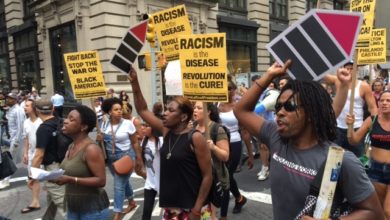In the early morning hours of Feb. 2, members of the Minneapolis Police Department executed a no-knock, pre-dawn warrant in the downtown Minneapolis apartment unit where Amir Locke, a 22-year-old Black man, was sleeping. Within nine seconds Amir Locke would be killed.
Hennepin County Judge Peter Cahill signed off on the no-knock warrant. Cahill was the judge who presided over the murder trial of Derek Chauvin, the former Minneapolis police officer who was convicted of the murder of George Floyd.
Bodycam footage shows that Locke was sleeping on the couch until an officer kicked the back of it, causing Locke to roll off. Locke, who legally had the right to own a gun and defend himself from intruders, is shown holding the gun, finger off the trigger, and pointing it safely away from police. Locke did everything correctly in that situation, but still paid for it with his life.
That evening community members swiftly mobilized, holding a vigil outside of the apartment building where Locke was killed.
The next day, Minneapolis Mayor Jacob Frey and Interim Police Chief Amelia Huffman held a press conference during which Frey gave a painfully embarrassing and out-of-touch statement invoking the “complexities” of the situation.
Activist Nekima Levy Armstrong, who serves as the co-chair of the city’s new Commission on Community Safety, interrupted the press conference to call out the “anatomy of a cover-up,” which is “business as usual” for city officials of Minneapolis. Questions were raised regarding why Locke was listed as a suspect in an initial press release when he was not a suspect, as well as other questions regarding the killing. In an act of “accountability,” Frey and Huffman then scampered out of the room.
Almost as quickly as those responsible went into hiding, the people of Minneapolis took to the streets in sub-zero temperatures and windchills. By the afternoon of Feb. 5, around a thousand protestors gathered in front of the Hennepin County Government building, chanting “Amir Locke” and holding signs reading “Frey lied, Amir died.”
With fists balled in anger, hearts heavy with sadness, eyes and ears focused, the crowd listened as Andre Locke, Amir’s father, spoke and processed his grief in front of hundreds.
“How dare you take my son away from me and his mother,” Andre Locke said. To the MPD he asked, “Who told you that you were the judge, jury and executioner?”
Locke’s Aunt Linda Tyler called out the city’s lack of transparency, asking, “Where are the rest of the cameras we haven’t seen that have been recorded?” She demanded the release of “all of the footage.”
Protesters then marched from the Hennepin County Government Building to the first precinct where more members of the community spoke demanding justice for Locke. Many of the people speaking at the rally highlighted how there has been little substantial change in MPD since the uprising over Floyd’s death in 2020.
According to Police Scorecard, Black people make up only 19% of the population of Minneapolis, but account for 70% of killings by police. They note that a Black person was 22 times as likely to be killed by police than a white person in Minneapolis from 2013 to 2020.
Feature photo: Protesters take to the streets of downtown Minneapolis to demand justice for Amir Locke, who was killed by police during a no-knock warrant. Liberation photo





